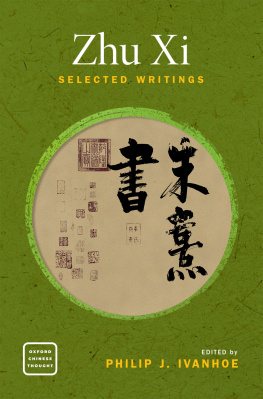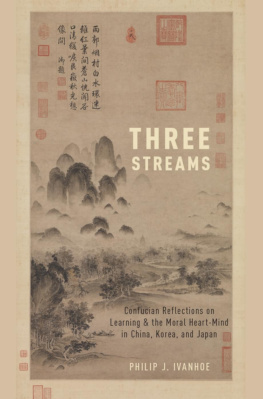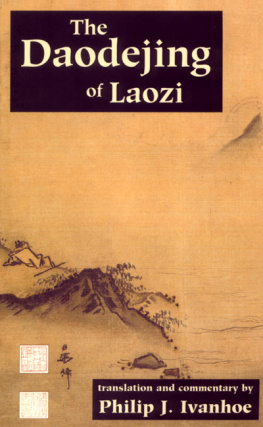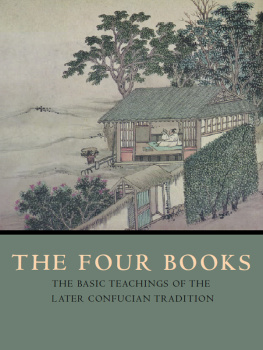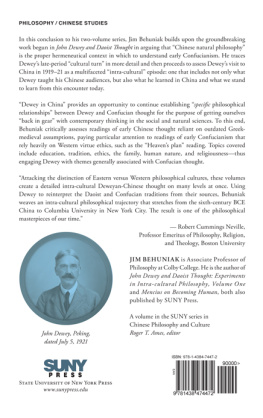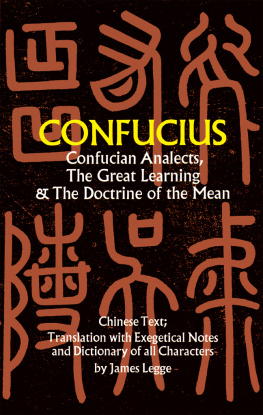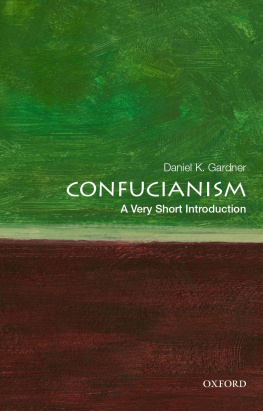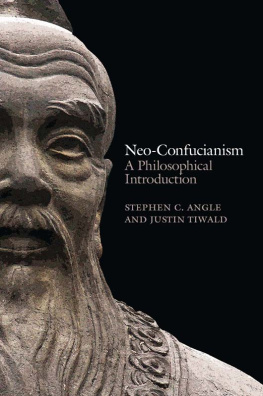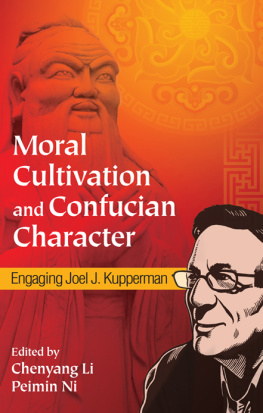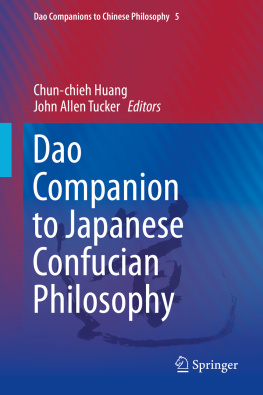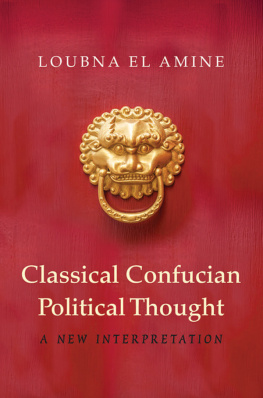Zhu Xi
OXFORD CHINESE THOUGHT
Series Editors
Eric L. Hutton and Justin Tiwald
Zhu Xi: Selected Writings
Edited by Philip J. Ivanhoe
Treatise on Awakening Mahyna Faith
Translated by John Jorgensen, Dan Lusthaus, John Makeham, Mark Strange

Oxford University Press is a department of the University of Oxford. It furthers the Universitys objective of excellence in research, scholarship, and education by publishing worldwide. Oxford is a registered trade mark of Oxford University Press in the UK and certain other countries.
Published in the United States of America by Oxford University Press
198 Madison Avenue, New York, NY 10016, United States of America.
Oxford University Press 2019
All rights reserved. No part of this publication may be reproduced, stored in a retrieval system, or transmitted, in any form or by any means, without the prior permission in writing of Oxford University Press, or as expressly permitted by law, by license, or under terms agreed with the appropriate reproduction rights organization. Inquiries concerning reproduction outside the scope of the above should be sent to the Rights Department, Oxford University Press, at the address above.
You must not circulate this work in any other form and you must impose this same condition on any acquirer.
CIP data is on file at the Library of Congress
ISBN 9780190861261 (pbk.)
ISBN 9780190861254 (hbk.)
ISBN 9780190861285 (epub.)
Contents
chinese writings from pre-modern times constitute a vast body of texts stretching back over 2,500 years, and while Western studies of China have been growing, many riches from the Chinese tradition have remained untranslated or have been given only partial translations, sometimes scattered across multiple publication venues. This situation obviously poses a problem for those who want to learn about Chinese thought but lack the ability to read Chinese. However, it also poses a problem even for scholars who specialize in Chinese thought and can read Chinese, because it is not easy to read across all the time periods and genres in the Chinese corpus. Not only did the Chinese language change over time, but in some genres particular vocabularies are developed and familiarity with certain earlier textssometimes quite a large number of textsis presumed. For this reason, scholars who focus on one tradition of Chinese thought from a given era cannot simply pick up and immediately understand texts from a different tradition of thought in another era. The lack of translations is thus an impediment even to specialists who can read Chinese but wish to learn about aspects of Chinese thought outside their normal purview. Furthermore, scholars are often hampered in their teaching by the lack of translations that they can assign to students, which then becomes a barrier to promoting greater understanding of Chinese history and culture among the general public.
By offering English translations of Chinese texts with philosophical and religious significance, Oxford Chinese Thought aims to remedy these problems and make available to the general public, university students, and scholars a treasure trove of materials that has previously been largely inaccessible. The series focuses on works that are historically important or stand to make significant contributions to contemporary discussions, and the translations seek to strike a reasonable balance between the interests of specialists and the needs of general readers and students with no skills in Chinese. Translators for the series are leading scholars and experts in the traditions and texts that they render, and the volumes are meant to be suitable for classroom use while meeting the highest standards of scholarship.
This first volume in the series, on Zhu Xi (11301200), well exemplifies our aim to give readers greater access to Chinese texts that have not been represented or have been inadequately represented among existing translations to date. Zhu Xi is without a doubt one of the most important and influential thinkers in history, having established what became Confucian orthodoxy and the educational requirements for nearly all government officials for several centuries, not just in China but throughout much of East Asia. He left behind a massive body of writings and recorded conversations that, as of a recent printing from 2002, comprises twenty-seven volumes, each of which is several hundred pages long. While a small portion of this material has been translated, the vast majority of it has not. Furthermore, previous translations of Zhu Xis work, though undeniably valuable, have tended to adopt a very specific focus, such as his views on learning or his commentarial work. As a result, it has been difficult for readers lacking knowledge of Chinese to gain an understanding of Zhus thought that encompasses the incredibly broad variety of topics covered in his writings. The present volume constitutes an important step toward filling this gap left by previous translations. We hope that it will serve to spur greater interest in Zhu Xi and may eventually lead to a complete translation of all his works.
Eric L. Hutton and Justin Tiwald
this volume, zhu xi: selected writings, is the first in a new series of translations of Chinese philosophical texts, Oxford Chinese Thought, edited by Eric L. Hutton and Justin Tiwald, aimed at providing English-speaking readers access to a range of Chinas most interesting and influential traditional philosophical writings. While parts of Zhu Xis works are available in English, this volume offers the first selection of Zhus writings across a broad spectrum of his core concerns that is designed to be attractive to students and scholars from a wide range of disciplines. It contains lightly annotated, accurate, and readable translations that represent much more of his work than is currently available and includes thoughtful introductions to the full range of his concerns. Our primary audience is scholars and students of East Asian Confucianism, broadly construed, to whom we offer an essential resource for gaining a comprehensive understanding of Zhu Xis thought. The complete Chinese text for the translated passages, compiled and meticulously edited by Eric L. Hutton, is available on the Oxford University Press website: http://global.oup.com/us/companion.websites/9780190861261/
the cover presents the final three characters of a monumental piece of calligraphy by Zhu Xi, one hundred and seven characters in length with each character being over five inches tall. The composition quotes and paraphrases three sections of the Great Appendix to the Book of Changes. The red seal below the final character belongs to Zhu himself. The large seal in the upper left belongs to the Qianlong Emperor and is one of four seals attesting to the fact that the piece was part of Qing Palace Collection. Appearing at the end of the scroll, the three characters mean [the characters were] written by Zhu Xi, but on the cover of our work they can also be read as Zhu Xis Writings.
the series editors and I would like to thank Peter Ohlin of Oxford University Press for his initial interest in developing this series and for helping us to craft the form and style of this volume. We thank the University of Utah and in particular its College of Humanities, Philosophy Departmentand especially their Charles H. Monson Awardand Confucius Institute, along with their administrative staff, for supporting and hosting a workshop held 2021 October 2017, which enabled the contributors to this volume to meet and discuss drafts of their individual contributions and larger issues concerning the format and content of this volume, and Nalei Chen for his participation in the workshop and offering a number of helpful suggestions that have enhanced this work. We also thank the

